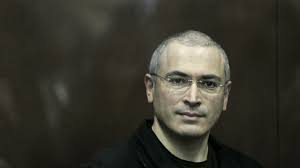

Gibney has made a career out of exposing government or corporate greed or misdeeds, but Citizen K feels more like a history lesson than anything else—meaning, if we don’t learn from it, we will be doomed to repeat it.
The K in the film’s title refers to displaced Russian oligarch Mikhail Khodorkovsky and tracks Khodorkovsky’s rise from poor child in the Soviet Union to exiled billionaire at the front of the anti-Putin movement. Like many stories of powerful men, Khodorkovsky’s is a complicated one, and Gibney takes us through his rise to power and wealth, which happened to coincide with the collapse of the Soviet Union and the creation of the new Russia and its nascent capitalist ideals after generations of communism. Khodorkovsky was part of a small group of men who understood what the fall of the Soviet Union meant and were the first ones to figure out how to take advantage of a political and social system in flux. Khodorkovsky became one of the richest men in the world, with every comfort, luxury and advantage afforded such a position.
But the new Russia was not a simple place. The fall of communism happened so fast that it was as if laws were drawn up on the backs of napkins. Those who knew how to game the still-evolving system were the ones to reap the rewards and while Khodorkovsky gained the system on the financial side, there was an equally ambitious Russian who was gaming it from the political one, Vladimir Putin. Citizen K tracks Putin’s rise through the Russian government and to his eventual position as President of Russia. Along the way, Putin and Khodorkovsky’s paths start to collide and Citizen K starts to turn from a history lesson to a profile of a mob boss. When Khodorkovsky’s interests started to get in the way of Putin’s ambitions, the two men found themselves on opposite sides of the power grab and Khodorkovsky eventually loses, finding himself imprisoned and exiled from a country he helped to build.
Gibney does a good job of not holding up Khodorkovsky as an angel who is in any way innocent, but his opposition to Putin and all he represents clearly puts the audience on Khodorkovsky’s side, which further muddies the ethical waters. And that’s exactly the point. Power begets power and there is usually no shortage of corruption and ruthlessness at the top. When Putin set his sights on taking Khodorkovsky down, there would be no laws to stop him, especially in a country that was still struggling with its own identity.
Citizen K is a truly fascinating examination of the politics and power plays that have shaped Russia into what it is today and forces us to see what and who Putin is and the lessons we, as Americans, can take from a story of a ruthless dictator who will tolerate no detractors or opposing voices. Gibney wants Citizen K to serve as a warning and it must be one we take seriously.
This review is from AFI FEST 2019. Citizen K will be released on November 22 from Greenwich Entertainment.
